Will Using a Cpap While Infected With Cdiff Make You Sick Again
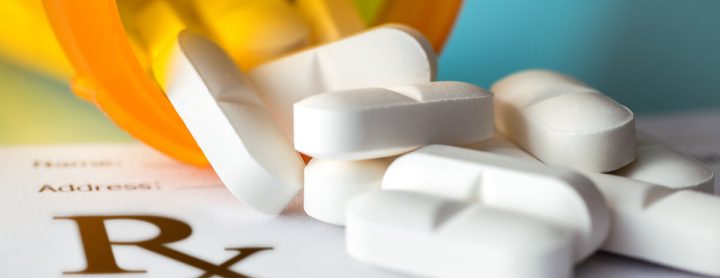
Antibiotics are medications that care for infections caused by leaner. Penicillin was the starting time antibiotic widely available in the 1940s. Since and then, researchers accept adult several others.
These medicines come in capsules, chewable tablets, powders for liquid suspension, intravenous formulations, creams and ointments. Most are available just by prescription, though some topical creams and ointments may be available over-the-counter.
Bacterial infections treated by antibiotics include infections of the ear, olfactory organ, throat, genitourinary tract and respiratory organisation. Each blazon of antibiotic may be more or less constructive for sure strains of leaner, and then a medical provider will choose the antibiotic that will work best for the specific infection.
Common uses for antibiotics include:
- Strep throat
- Sinus infections
- Ear infections
- Urinary tract infections
- Traveler's diarrhea
- Skin infections
- Pneumonia
- Pinkish eye (bacterial conjunctivitis)
Antibiotics don't work against infections caused by fungi such equally yeast infections and athlete's foot or viruses such as the flu and the cold.
Using antibiotics incorrectly tin lead to a relapse of illness or antibiotic resistance. Sure antibiotics can't kill bacteria that take antibiotic resistance, and this can make it harder to care for serious infections.
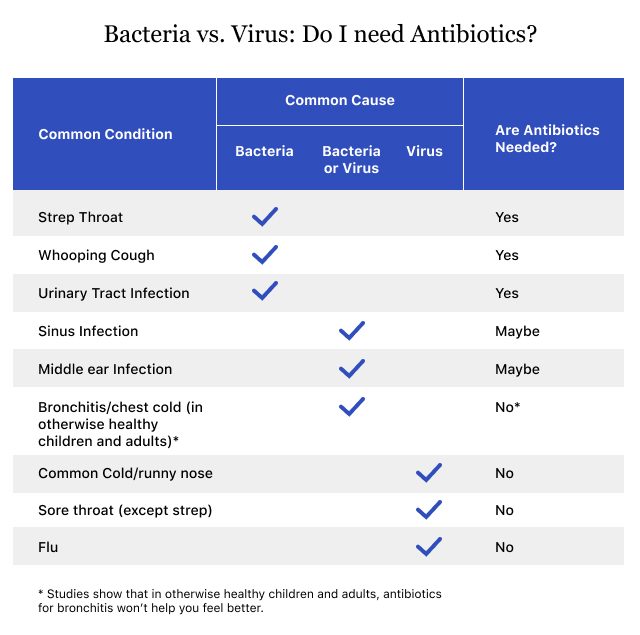
Aggrandize
Source: The Centers for Illness Control and Prevention

How Practice They Work?
Mostly, antibiotics work to treat bacteria in two ways. Antibiotics called bactericidal agents cause bacterial prison cell decease. Others called bacteriostatic agents finish bacteria growth and reproduction.
For example, bactericidal antibiotics like penicillin and amoxicillin cause breakdown in bacterial jail cell walls. This leads to cell death. Antibiotics similar erythromycin and clarithromycin primarily preclude bacteria from synthesizing protein, stopping their growth.
Ii Chief Ways Antibiotics Piece of work
Bacteriostatic antibiotics prevent leaner jail cell growth, and bactericidal antibiotics impale bacteria.
Antibiotics start working right abroad after a person takes them. Each antibiotic may stay in the body for different lengths of time, but common antibiotics such as amoxicillin and ciprofloxacin stay in your system for nearly 24 hours after taking the final dose. Information technology might take longer for people with dumb kidney function to eliminate the drug from the body.
Some antibiotics will take days to leave the trunk. Azithromycin stays in the body for well-nigh xv days afterward the terminal dose.
Ask your pharmacist or medical provider for specific information on how long the antibiotic y'all are taking stays in the body.

Common Types
There several classes of antibiotics available in the The states. These drugs are grouped together by their chemical structure. Each antibiotic grade has similarities and differences in how effective they are at treating sure types of bacteria.
Mutual Types of Antibiotics
| Class | Examples | How They Work |
|---|---|---|
| Beta-Lactams (sub classes: penicillins, carbapenems, cephalosporins, monobactams) | Penicillin, Amoxil (amoxicillin), Keflex (cephalexin), Premaxin (imipenem), Omnicef (cefdinir) | Kill bacteria by preventing formation of the bacterial cell wall |
| Fluoroquinolones, or Quinolones | Cipro (ciprofloxacin), Levaquin (levofloxacin), Avelox (moxifloxacin) | Kill leaner by preventing bacteria from making Dna |
| Macrolides | Zithromax, Z-Pak (azithromycin), Erythrocin (erythromycin) | Prevent bacteria from multiplying by preventing them from making proteins |
| Tetracyclines | Sumycin (tetracycline), Adoxa and Adoxa-Pak (doxycycline) | Prevent bacteria from multiplying by preventing them from making proteins |
| Glycopeptides | Vancocin (vancomycin), Dalvance (dalbavancin), Orbactiv (oritavancin) | Kill bacteria by preventing formation of the bacterial cell wall |
| Polypeptides | Baciim (bacitracin), polymyxin B | Kill bacteria by preventing formation of the bacterial cell wall |
| Sulfonamides | Sulfamylon (mafenide), sulfadiazine | Foreclose bacteria from multiplying by preventing them from making proteins |
| Oxazolidinones | Zyvox (linezolid), Sivextro (tedizolid) | Prevent bacteria from multiplying by preventing them from making proteins |
| Nitroimidazoles | Flagyl (metronidazole), Tindamax (tinidazole) | Kills bacteria by disrupting production of genetic cloth |

How to Have Antibiotics
Always take antibiotics for the length of time that they are prescribed, even if symptoms have subsided. Make sure to read the drug label carefully before taking the medication and ask your medical provider or pharmacist nearly any side effects or precautions y'all should take.
Information technology's important to brand sure you take your antibiotics at regularly scheduled doses — for case, every 8 hours or every 12 hours. This is so the medicine's event spreads out evenly over the course of a solar day. Make sure to ask your medical provider if you should have your medication with food or on an empty stomach.
If y'all miss a dose, take information technology as soon equally y'all remember. But if it'south closer to your next scheduled dose, skip it and accept your next dose at the regular scheduled time. Never have two doses at in one case to make up for a skipped dose.
The CDC recommends:
- Talk to your medical provider if y'all have questions about your medicine.
- Don't share your antibiotics with others.
- Don't save extra antibiotics for afterwards. Take your medication for the length of fourth dimension prescribed by your medical provider.
- Never affluent expired antibiotics and ask your pharmacist for the all-time way to dispose of old medicines.
- Don't take someone else'due south antibiotics because yous feel sick. This could make you sicker or cause side effects.
Can you drink alcohol while taking antibiotics?
In full general, it's safety to drinkable alcohol in moderation with most antibiotics. Only three antibiotics — metronidazole, tinidazole and trimethoprim-sulfamethoxazole — tin can pb to serious reactions with alcohol, according to the Uk's National Health Service and the University of Pittsburgh Medical Centre.
Potential reactions with these medications include:
- Nausea
- Headache
- Dizziness
- Irregular or fast heartbeat
- Flushing
- Intestinal and chest discomfort
- Vomiting
The prophylactic of drinking alcohol while taking specific antibiotics may be unlike for dissimilar people. Therefore, you should e'er check with your doctor or pharmacist earlier drinking alcohol while taking an antibiotic.
Can you eat dairy while taking antibiotics?
Eating dairy products such every bit butter, cheese, milk and yogurt can interfere with how some antibiotics work. You lot may accept to wait up to three hours later on taking an antibody to eat dairy products.
Practice antibiotics affect birth control?
Some antibiotics may increase the breakdown of estrogen, decreasing the effectiveness of birth command. But co-ordinate to Planned Parenthood and UpToDate, the only antibiotic that could make nativity command less effective is rifampin, known under the brand names Rifadin and Rimactane.
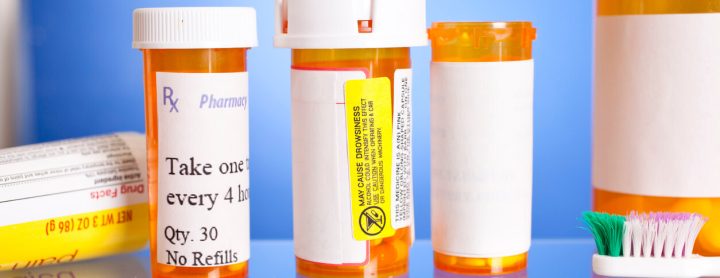
Storing Medicine Properly
In general, you should store antibiotics in a cool, dry place. Just information technology's of import to follow instructions on the drug label and whatsoever instructions given by a medical provider or pharmacist regarding your specific antibiotic. For instance, some medicines may need to be refrigerated.
Is It Prophylactic to Take Expired Antibiotics?
Don't take expired antibiotics. Expired antibiotics may fail to properly treat infections and pb to antibiotic resistance.
Each package of medicine will have an expiration date printed on it. Don't take antibiotics by the expiration date. Expired antibiotics may fail to properly treat infections and lead to antibiotic resistance, according to the FDA.
Tests on drug stability from the mid-1980s to early on 1990s plant that liquid antibiotics showed signs of physical decay afterward expiration, according to an article published by Harvard.

Side Effects of Antibiotics
Antibiotics save lives, but most one out of five ER visits each yr is linked to antibiotic side effects. These side furnishings are also the most common cause of ER visits for children younger than xviii years of age, according to the Cleveland Clinic.
Considering these are powerful drugs, people should be mindful of misusing them. Most common side effects are mild. If they go worse or don't go abroad, talk to your medical provider.
Common antibiotic side effects include:
- Diarrhea
- Stomachache
- Nausea
- Yeast infections
- Headache
Some side effects tin can be serious. These include allergic reactions and an infection caused by Clostridium difficile.
Drug Side Furnishings
Learn more about the mutual and serious side effects associated with prescription drugs.
Allergic Reactions
Before y'all accept antibiotics, tell your medical provider if you've had a history of allergic reactions to penicillin or other antibiotics.
If yous experience whatsoever of the following allergic reactions, seek medical help immediately:
- Swollen face, lips, mouth or tongue
- Difficulty animate
- Skin rash or hives
- Difficulty swallowing or breathing
- Itching
- Pare peeling or blisters
- Wheezing
Clostridium Difficile
Antibiotics alter the helpful bacteria in your gut and can lead to an overgrowth of a bacterium called Clostridium difficile, or C. diff, which can cause astringent diarrhea and potentially fatal colitis (inflammation of the colon). Tell a medical provider if yous develop severe diarrhea, fever, cramping, tum pain or bloody stool later using antibiotics.
Taking Probiotics with Antibiotics May Help with Side Effects
In the case of diarrhea, abdominal cramping or gas, some research suggests taking a probiotic with your antibiotic may help lessen side furnishings, according to the Cleveland Dispensary. Probiotics too include fermented foods like sauerkraut or yogurt.
Probiotics can also aid with diarrhea from C. diff. In fact, one analysis published in the journal Infection Control and Hospital Epidemiology by Bradley Johnston and colleagues found a reduction of up to 65 percent in C difficile-associated diarrhea in patients taking probiotics with their antibiotics. This do good may be greater in patients who have a higher risk of developing diarrhea from C. unequal. Talk to your doctor to aid determine if y'all are at a college than usual adventure.
The most commonly used probiotics for antibiotic-associated diarrhea are Lactobacillus rhamnosus-based and Saccharomyces boulardii-based probiotics. Before taking any probiotics, brand sure you lot ask your medical provider or pharmacist if they are prophylactic for you.
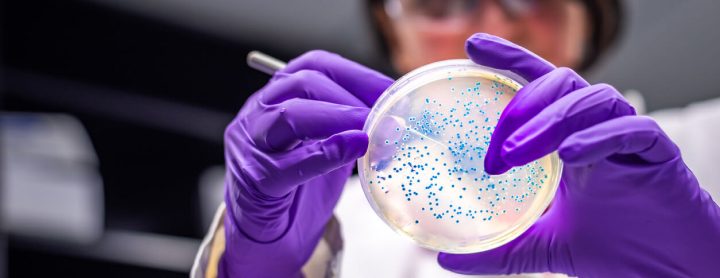
Antibody Resistance
Antibiotic resistance occurs when bacteria develop ways to protect themselves against antibiotics.
"If you keep using the same antibiotics routinely, the bugs basically mutate, and they can live through antibiotic treatment," immunologist and thoracic surgeon Dr. Hooman Noorchashm told Drugwatch.
This means fewer drugs tin can impale them, and these infections may get more dangerous. Someone who is infected with bacteria that is resistant to antibiotics will normally need to stay in the hospital longer and doctors will have to use treatments that are more expensive and have more side effects. Antibiotic-resistant bacteria cause more than 2.eight million infections annually, and more than 35,000 Americans die each year because of them, according to the Centers for Disease Control and Prevention.
Antibiotic resistance is one of the almost urgent threats to public health. It is continued to the health of people, animals and the environment.
Common antibiotics and resistant infections include:
- Penicillin, released in 1941
- Staphylococcus aureus (staph infection), Streptococcus pneumoniae (pneumonia, ear infections, sinus infections and meningitis), Neisseria gonorrhoeae (gonorrhea)
- Vancomycin, released in 1958
- Enterococcus faecium (endocarditis, prostatitis, urinary tract infections, intra-intestinal infection, wound infection and cellulitis), Staphylococcus aureus (staph infection)
- Ciprofloxacin, released in 1987
- Neisseria gonorrhoeae (gonorrhea)
- Ceftazidime-avibactam, released in 2015
- Ceftazidime-avibactam-resistant KPC-producing Klebsiella pneumoniae (pneumonia, wound or surgical site infections, bloodstream infections and meningitis)
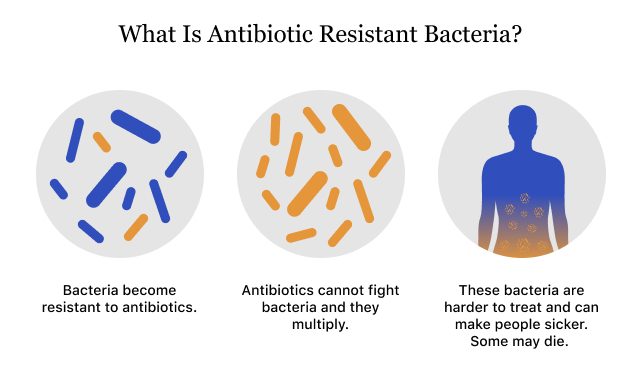
Aggrandize
Anytime antibiotics are used, they may crusade resistance. Only misusing antibiotics can make bacteria resistant faster.
Antibiotic resistance tin can occur someday antibiotics are used. That'southward why it's important not to employ antibiotics if you don't demand them. If your physician determines that you do not have an infection that needs antibiotics, you lot should not insist that yous receive an antibiotic. Too many antibiotics are beingness misused and prescribed when they are not needed. The CDC estimates that almost 47 million antibiotics are prescribed for infections, similar the cold and flu, that do not need these drugs.
Another way you can help prevent the threat of antibody resistance is to make certain you lot take antibiotics as directed for the full length of treatment to kill all organisms. You should not save antibiotics for use at a later time and you should never share antibiotics with someone else.

Takeaways for Using Antibiotics Safely
Dr. Hooman Noorchashm prescribed antibiotics to his patients for years. These are some quick, basic tips that he gave his patients for taking antibiotics safely.
- Get a Specific Diagnosis
- "You want to make sure that there's a specific bug that you are afflicted past and have a diagnosis for, like strep pharynx for example," Noorchasm said. "You don't want to accept antibiotics just considering you feel ill."
- Don't Take Antibiotics to Prevent Sickness
- "You don't want to accept antibiotics prophylactically (to prevent illness) unless your medical provider has given yous a clear indication," said Noorchashm. "For case, some patients with middle valves who are going to have a dental procedure take to accept antibiotics to prevent infections."
- Communicate Allergies
- "Tell your medical provider about any known allergies to penicillin (or other antibiotics) to make certain they don't give you that class of antibiotics," said Noorchashm.
- Inquire About Side Effects
- "All of these drugs at a certain rate will cause agin events, anywhere from colitis from C. diff to nervus impairment and hearing loss," Noorchashm said. "This is why yous don't want to apply them unless you are treating a real bacterial infection."
Source: https://www.drugwatch.com/health/taking-antibiotics-safely/
0 Response to "Will Using a Cpap While Infected With Cdiff Make You Sick Again"
Post a Comment